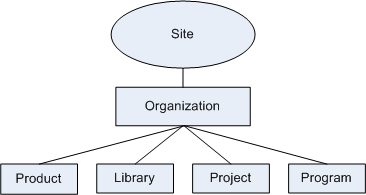Administering Preferences
Administrators for the site, organization, and other application contexts (such as a projects, programs, products, or libraries) can set preferences for the contexts which they administer.
To access the preferences for a particular application context, click the Preference Management link on the Utilities page of that application context. The complete list of preferences for that context is displayed.
Site and organization administrators can switch between contexts by clicking the find icon

next to the
Context field at the top of the page, and searching for other available application contexts.
Preference values set at one level are inherited by the application contexts below. For example, preference values set at the site level are inherited by the organization; application contexts within the organization inherit preference values from the organization, as shown in the following figure:
| User preferences can be inherited directly from the organization level, from individual application contexts, or can be unique (able to be set only at the user level). |
Preference values can be set for each application context, or for an individual user, unless the preference value is locked at a higher level. For example, if a preference is not locked at the organization level, then it may have one value at the organization level, but individual products or projects within that organization could each specify a different value. Similarly, if a preference is not locked at an organization level, but is available at the user level, individual users could each set different values for that preference.
Preferences can be locked at any level above the individual user. If a preference is locked, then the value cannot be changed for any lower levels. A site or organization administrator can choose to delete all values for a particular preference that may be set at levels below the current context. These values at lower levels are known as child instances.
If a preference is not explicitly set for a particular application context, then the value for that preference is inherited from the level above. For example:
• If a preference is not set for a particular product or project, then the value set for that preference at the organization level is used.
• If the preference is not set at the organization level, then the value set for that preference at the site level is used.
• If no preference is set at any level, then the default value defined for that preference is used.
For more information on using the
Preference Management utility, see
Preference Management.
 next to the Context field at the top of the page, and searching for other available application contexts.
next to the Context field at the top of the page, and searching for other available application contexts.